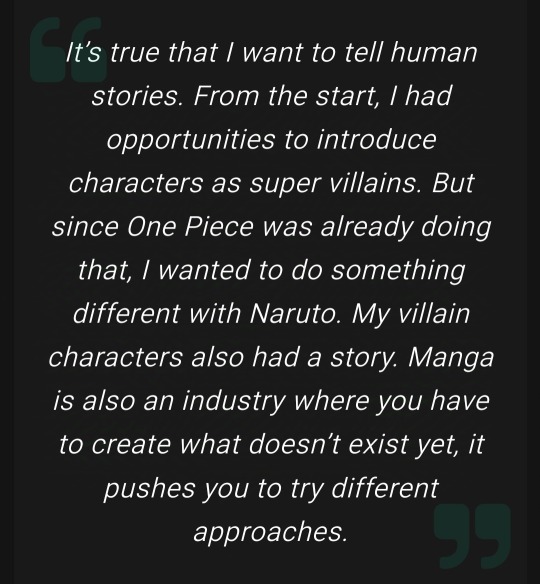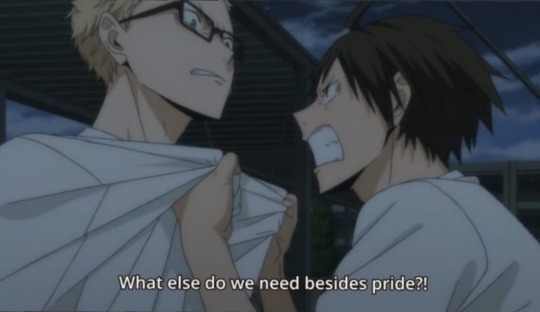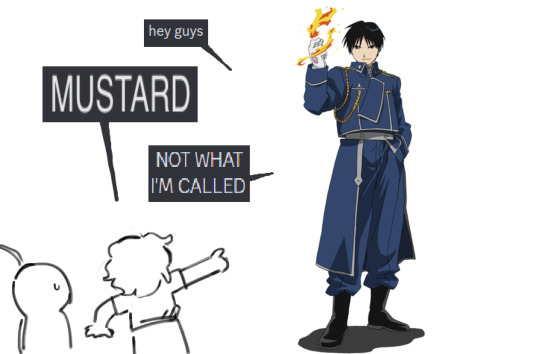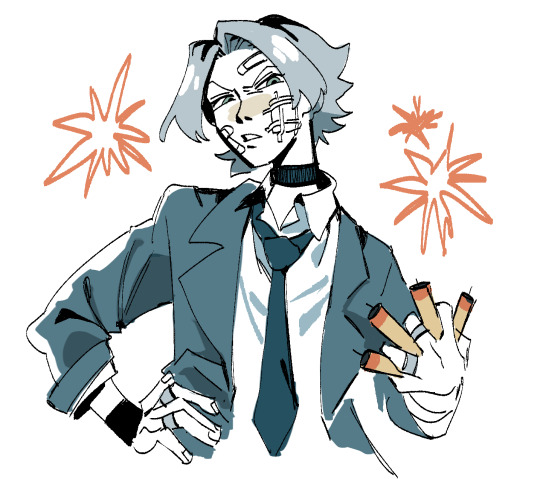Rye queer 27 | side blog | haikyuu is the only worthwhile shonen you cant change my mind ✡️
Last active 60 minutes ago
Don't wanna be here? Send us removal request.
Text
Seiya taking hacks with a katana.
49K notes
·
View notes
Photo



WASURETEEEE SHIMAUU DAROUUU
5K notes
·
View notes
Text
other nen users find themselves repulsed by my spanish guitar motif and presumably no other aspect of my conduct or beliefs
710 notes
·
View notes
Text
hears jazz in an anime: getting big baccano vibes from this
42 notes
·
View notes
Text
feeling really crazy today thinking about the jackadlers match with fact that the whole stadium was chanting shoyo's name, celabrating his plays, and shoyo turned back to meet tobio's eyes and smile at him to share his glory with his person. meanwhile tobio was mirroring his satisfied grin, knowing that his someone better finally caught up to him and made him the happiest :'))

240 notes
·
View notes
Text

them. again
7K notes
·
View notes
Text
rewatching Naruto and going insane over the extremely obvious way Horikoshi copypasted the essence of that story into MHA. funnily, the ending proves that he doesn't seem to fully understand the source material.

what really makes Naruto stand out is that every character is treated as a human who is worthy to make their story known. it's still shounen so the powerscaling and violence are ever present but the humane element never goes away. it might seem downright ridiculous that up until the undead evil aliens come to assume the big bad role in the end, every big bad that has been carefully hyped up before ends up revealing their sob story and leaving the spot vacant. but this was precisely what made the characters so interesting that they still have loyal fans nearly two decades later. the audience was always allowed to sympathize with the villain, no matter how evil, violent or how long their kill list is, because what it really comes down to, is a collection of various people's stories about their trauma and how they deal with it.
all of the villains have extensive kill lists: Gaara was a serial killer at the tender age of 12, Itachi killed his best friend, his girlfriend, then his entire clan and mentally tortured his 7 years old little brother, Sasuke later goes on a killing spree and nearly murders several people who considered him heir friend, Obito and Madara killed more people than there are named characters in the Naruto universe, and so on and so forth. the story still encourages the readers to sympathize with these characters, to the point of obnoxious stubbornness, but it drives the point home. Naruto's approach to writing the villain characters is the antithesis of 'cool motive, still murder'. the story is much more concerned with telling the stories about individual characters, their traumatic backstories and how they deal with the trauma, than it is with the worldbuilding angle of 'and what legal consequences are coming for them next?'. the story would rather conveniently lean to fit the chosen narrative for each villain character than deal with realistic consequences, just so that the character remains sympathetic and/or tragic in the eyes of the audience. Gaara was known for being violent and unstable in his village, but after he had his change of heart he is allowed to become the Kazekage and is accepted and supported by his village. Nagato wipes out the entire Konoha village because he is supposed to be introduced as the ultimate big bad to date, but then magically brings back everyone to life in a disney esque move, because after unlocking his tragic backstory, we are supposed to consistently feel bad for the guy. the story would rather be ridiculously unrealistic to overstress the tragedy and trauma, because realism was never the purpose.
then, in MHA, which is a story about magic people using their individual magic skills to fight and save people, you would assume that the realism wouldn't be a primary concern here as well. at the heart of the concept, before it fell apart, MHA seemed like a perfect successor to the message conveyed in Naruto, which excused the various rip offs. it seemed Horikoshi had successfully cracked what was the problem at the heart of every single villain in Naruto: trauma and mental illness, and capitalized on it. the concept of the story seemed to be 'what if Naruto set out to save the Akatsuki?'.
(and it is impossible to deny the heavy inspiration, because s1 Shigaraki is literally chuunin exam era Gaara. they are the exact same character)
as a fan of Naruto and not much of a shounen enjoyer, MHA seemed to take everything i loved about Naruto and amplify it. the kids characters got to spend more time together as a clas, rather than being paired randomly during filler episode missions. we got to spend more time with the Akatsuki League of villains and got to see how they interact with each other as a group and what their individual relationships are like. they got to build up their tragic backstories early on, to be dramatically revealed later, and not immediately die afterwards. Shouto got to actually talk to his older brother, and discover his tragic backstory from the source instead of hearing about it after his death and being powerless to do anything but cry about it.
but then, around the final arc, the story, or rather the author, seems to realize that it has become too big for a shounen. and his way of dealing with the issue was abandoning everything he has been building up for years. the comparison with Naruto really highlights how the issue lies not in the characters and their irredeemable actions but in the story straying too far from the main theme and eventually getting lost completely.
that is not to say the execution or the plotline wholeness were not an issue in Naruto, it's riddled with plot holes and retcons. but where it lacks the logic and stability, it makes up with the sincerity and compassion the author never fails to have for his characters. the uchiha massacre was a really shitty plot line from a political standpoint, but it's not there as a part of the plot. it has always served as a background for Sasuke, first and foremost, to the point Itachi's character was reshaped and retconned twice to fit what Kishimoto had going for him. the plot, the world are a stage for the characters, not the other way around.
and what made MHA's writing fall apart was switching the focus from the characters as the driving forces for the story to the sociopolitical plot starting to use those characters as tools. before the war arc, it wasn't meant to be realistic, the 'reality' was a playground for the characters. just look at the MVA arc (the best MHA arc). what about a malnourished insomniac Shigaraki defeating a CEO who happens to be the leader of a terrorist organisation so hard said CEO is so impressed with him that he gives up his spot for Shigaraki is realistic? alternatively, what about the Sports Festival arc makes sense? nothing! the students of the most prestigious hero academy having the competition where they show off their quirks and all of its drawbacks for the entire country to see on live TV is the opposite of sensible, and during the licence exams the students of the other schools even point this out! Horikoshi just wanted to have his own chuunin exam arc, and can you fault him for that? it was cool as hell.
the thing about MHA is that it was never meant to be too realistic. it can't be, because the realism hurts this kind of story. shounen isn't meant to be realistic, it's meant to be flashy, cool, over the top dramatic, perhaps tragic, but realism really has no place in shounen. most importantly, because shounen is supposed to tell the story of the main character, whose epic journey is as enjoyable as it is inspiring.
but the main character's journey is supposed to have an end purpose, and successfully achieving it would be the culmination of the story. Naruto's purpose was saving Sasuke, who was taken in by the Big Bad Orochimaru, when everyone else has given up on him. Izuku's purpose seemed to be saving Shigaraki, who was taken by the Big Bad All For One, and the entire world has given up on saving him when he was just 5 years old. thus, Izuku would become 'the world's best hero', because he achieved an unprecedented fit of saving a villain. hell, he would have been even cooler than Naruto, who mastered the therapy talk jutsu on all the villains he had successfully reformed, but still had all of them die on him.
but no. funnily, Izuku fails spectacularly at achieving the purpose he had set for himself. Izuku doesn't save Shigaraki, he actually kills him. not even on purpose, Tomura's death was entirely an accident. (to really drive home how ridiculous that is, can you imagine Naruto murdering Sasuke on accident during their final battle, and then moving on with his life? an even more accurate example, imagine Naruto killing Gaara instead of giving him a heartfelt speech in s1)
by simple shounen logic, this means Izuku failed as a shounen character. he doesn't get his happy ending, because he didn't deserve it through consistently written and developed hard work towards a singular goal the character had chosen for himself. this also means Izuku didn't become the world's greatest hero. he lies to us in the prologue.
but we can't have a tragic ending to such optimistic and hopeful story now, can we? so the story does a very awkward and forced job of switching the perspective to drive the audience attention from the reality of the tragedy the ending brought on it. to drive attention away from Izuku and his failure, we have the public aggressively blaming Shigaraki for the destruction. his story is never made known and Izuku is not particularly interested in making it known, putting this responsibility on Spinner. Allmight, who felt personally responsible for Shigaraki's kidnapping by AFO back when he was alive is suddenly unbothered by his passing. the epilogue has nothing to focus on because every hero character had failed at achieving their personal goals and thus peaked. it is also weirdly stubborn in its refusal to seriously view the aftermath as tragedy, following the characters (acknowledged!) failure to save the villains they intended to save. the explanation was still warranted however, so the chosen strategy was focusing on the outside world and how it was affected by the consequences. but it simply won't work because the story was never focused on this before! it's no Avengers Civil War, The Boys or even MHA Vigilantes. MHA was always about the characters and their individual experiences. the world leaned into the characters plot points and shaped itself accordingly, not opposed the various socioeconomic and political problems that the concept of heroes would bring. the heroes ranking and HPCS are the highest authorities we know of in MHA. who is the president? who are the politicians? why is so much budget spent on the heroes, to the point the devastated and ruined after the war country deems it important enough to build various statues of them? the issue of quirk racism is consistently important, but why aren't any anti racism organisations brought up? isn't there any legal punishment for violence against mutants? does the law just permit harming or even killing mutants? shouji had his damn face cut up as a kid and his parents never went to police or made a lawsuit about it? we do know that police exists separately from the heroes, but how does law work at all in this universe? the answer is, it doesn't, because Hawks has a footage of him committing a murder shown on national TV and he doesn't face any legal repercussions at all, and is in fact promoted to a HPSC president shortly afterwards.
i hope the above paragraph conveys how utterly cartoonish MHA's 'realism' is. and what makes it bad isn't the illogical inconsistency or even the double standards, it's that the realism is used as a coverup for the author smashing the core theme of the story he took from another manga with hammers and setting it on fire. it's 400 chapters too late to make the core theme of the story the society in general and various social issues as concepts. it was supposed to be a story about Izuku saving Shigaraki, Ochako saving Himiko, Shouto saving Dabi. i don't have to reach to get that message from the source text itself, because no one forced Horikoshi to repeat the world 'save' 27363279 times throughout the story. it was supposed to be a story about saving traumatized people who had no one to save them. it didn't have to be, Horikoshi could have easily continued with Kishimoto's established trend of having his villains die immediately after finishing their therapy session. but he didn't take that direction, and capitalized on the theme of saving people, even those who don't seem to deserve it, even those who say they don't want to be saved. and in the final, crucial moment, he didn't carry through.
this is the story of how Izuku didn't become the greatest hero.
my not-hero academia
118 notes
·
View notes
Text
Seeing a lot of takes about how Kafka Hibino feels “like a teenager”/“like every other Shonen MC” but as someone rapidly approaching his age range, his portrayal feels really solid to me.
He is quick to point out what those around him are doing right. Despite trying to prove he belongs, he doesn’t let his ambition or pride interfere in his perception of his teammates. It’s a specific form of security and sincerity that only comes with life experience.
And the result is that the other members of the cast trust him.
They may rag him from time to time, but they see him as someone to admire, even though they’re vastly superior in terms of traditional Kaiju hunting. IMO, that’s not a dynamic you can create using characters in the same age range.
2K notes
·
View notes
Text
has anyone compiled (just notes or gifset or anything) all the pre serve rituals from haikyuu? bc i just saw someone point out that kageyama and oikawa both spin the ball before they serve and i wondered if any other characters had similar routines
1 note
·
View note
















